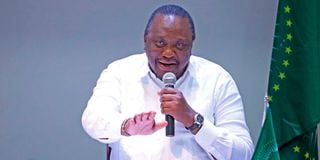Lessons for Uhuru on why writing memoirs is crucial

Former Kenyan President Uhuru Kenyatta during a senior commanders meeting on the implementation of the cessation of hostilities agreement between the government of the Federal Democratic Republic of Ethiopia and Tigray people’s liberation front (TPLF) in Nairobi on November 7, 2022.
“On January 15, 2008, I handed over my office and all its trappings to Kalonzo Musyoka. At the age of 80, I was out of a job for the first time since the age of 23. On getting out of the lift downstairs at Jogoo House… I got in my personal car with my aide, Sgt Dan Ambuya, and left for my house in Lavington.
No chase cars, no battalion of security. Just back to where I had started. The next day, I woke up at my usual time at 4.30 am to do my callisthenics (exercises)… I dressed formally for office… Then it hit me: I was out of a job! I was not going to the office. Nobody was coming for consultation”.
This is probably the most poignant part of former Vice President Moody Awori’s memoirs entitled, Riding on a Tiger: An Autobiography. As I reread these words recently, I found myself thinking about former President Uhuru Kenyatta (in his retirement) who has been featured in the media recently for his high-profile role in peace negotiations in neighbouring countries.
With fewer chase cars and a thinner layer of security, maybe the former president misses the glamour of the presidency — the swift salutes, the flashing lights, the fluttering flags and the blaring sirens of the presidential motorcade.
Enlightening
Nevertheless, how will people ever know the details of his life story? It would be enlightening if the former president wrote his memoirs to tell the story of his storied career. Though he served as president for 10 years, he is still inscrutable and enigmatic. Many Kenyans don’t really know him or what inspires him.
Memoirs give one a unique opportunity to tell their life story. President Uhuru has lived through the ups and downs of life and has many fascinating things to share with the world. As a critic once aptly remarked, “The trick to writing an autobiography is to treat it like any good story: it should have a protagonist (you), a central conflict, and a cast of fascinating characters to keep people engaged. You may want to think about a certain theme or idea that has been present in your daily life to revolve your story around”.
And he can borrow a lot from the 2022 Nobel Laureate in Literature, Annie Ernaux, who was awarded the Nobel “for the courage and clinical acuity with which she uncovers the roots, estrangements and collective restraints of personal memory”.
The former president will need the courage to uncover his roots, especially in highlighting his background. He can learn a lesson from Ernaux who wrote the book entitled A Man’s Place, in which she writes not only about herself but also her father. Like Ernaux, the former president cannot tell his story without writing about his father (Jomo Kenyatta) — the story of his father as he understands him to have been, and how their relationship affected his life as a scion of the founding father. If politics is a menacing and gothic landscape, father and son were both wild with imagination, unafraid and ambitious. They crossed thresholds and scaled the walls of destiny that have held millions back from reaching the coveted office of the presidency.
His father still looms large in our politics with a fairy-tale façade, flashing before us like a mirror. He is revered for his strength, gravitas and the ruggedness of the great; his flywhisk, even in photos, seems to exude enormous, brooding and mysterious power.
The former president, in his memoirs, can tell us when he first got an interest in politics. Did he always have dreams of being a king of a vast domain like his father? When his father died, maybe through the trauma and loss, he went into obscurity, developing a sense of self that grief threatened to dissipate.
Untold stories
An autobiography would help him excavate into his life — into stories untold, memories unshared, the treasures that await our discoveries if we trace our beginnings. The Kenyatta dynasty had a good run but was truncated sharply after Jomo Kenyatta’s death in 1978. The magical chain seemed to have been broken; the dynasty shattered.
Uhuru Kenyatta may have forgotten things presidential for some time in the years of obscurity after his father’s death. Then maybe, in his moments of accidental reflection, he caught powerful reminders that he was a former president’s son and felt the pull to do something better and bigger with his life. Maybe he felt some dissatisfaction with his accomplishments until that time — a pull of destiny or a gnawing feeling that dogged him all the time.
At one point, he must have decided to go for the top seat. Unlike his father who made one big leap to first Kenyan prime minister and then president, the son swivelled, leaping from position to position, like one on a spiral staircase up from the bottom through the cosmic flow in the most awkward corners, into the realms of wit, worry, and ‘what ifs?’
He then successfully salvaged the family bloodline when he clinched the presidency. Like a man of unique seasoning, he has been a subtle conqueror who invariably triumphs in the end — overrunning stiff political resistance. I hope former President Uhuru pens down his memoirs like a few other public figures have done already. We’ll all be richer for it.





